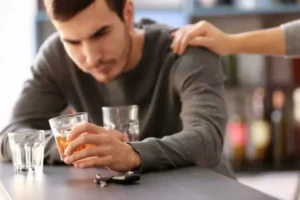
For instance, triggers may occur when someone remembers an event, or when an uncomfortable experience happens. The experience may cause someone to lash out, breakdown, or cope in unhealthy ways. https://ecosoberhouse.com/ As a result, individuals with unchecked triggers can cope in harmful ways, foster unhealthy relationships, and endure much suffering.

Start your recovery with Massachusetts Center for Addiction
Once patients have learned to identify their triggers, a plan of action is necessary to help avoid and anticipate the effects. Specialists often recommend “thought stopping” strategies, the development of refusal skills, and the avoidance of high-risk situations. Addition treatment will help patients learn how best to utilize these strategies while forging their own recovery path. An internal trigger is something going on inside our minds or bodies that promotes the urge to relapse.
Old Places And Hangouts Can Trigger Relapse
• Persistent worry, fear, or tension stemming from internal or external expectations may lead to self-preserving behaviours. • Difficulty processing overwhelming sensory input, such as loud noises, bright lights, or strong smells, may lead to distress. The prevalence of triggers to challenging behaviour will vary according to each individual. Others may casually say they’re triggered anytime something angers or upsets them, further causing the word to lose its meaning.

How To Disarm Internal Triggers and Improve Focus
Well, think of them as road signs pointing toward potential relapse risks. By understanding your personal triggers, you gain invaluable insight into what may lead you down an unhealthy path again. It becomes easier then to develop strategies for overcoming these challenges and maintaining your progress in recovery. External triggers are easier to identify and manage than internal ones. Substance abuse treatment aims to help individuals recognize the early warning signs of relapse and develop healthy coping skills to thwart a potential relapse. Consistently practicing self-care and addressing HALT conditions (Hungry, Angry, Lonely, Tired) will further strengthen your resilience.
- Whether you are struggling with addiction, mental health or both, our expert team is here to guide you every step of the way.
- A therapist can help you identify and cope with your PTSD triggers in a safe and supportive setting.
- Triggers are a crucial aspect of addiction recovery, and understanding how they work is essential for maintaining sobriety.
The solution to managing difficult situations is learning how to confront them without drugs and alcohol. If you’re not sure how to confront these situations, contact us today. At Isaiah House, we’ve helped thousands of men and women escape the grip of addiction. In our treatment centers, clients go through addiction counseling that teaches them how to identify and cope with their potential triggers. As a person recovers from addiction, they may experience strong desires to return to the substances they have abused in the past.

Finding Support and Managing Triggers at AToN Center
Dealing with triggers is one of the most common shared experiences in recovery, and it may feel scary to some. Deciding to get treatment for substance use disorder can be a life-changing decision. Don’t face these challenges alone—join our community at The Retreat today! Take internal and external triggers examples that first step toward overcoming your triggers by reaching out to us; we’re here to support you every step of the way on your path toward lasting recovery. A daily journal can be your trusted companion on the road to recovery.

- The first step to managing distraction is to recognize that it starts from within.
- Triggers can cause individuals to develop a “flight or fight response.” Since this reponse can cause great distress and anxiety, it is often suggested for those struggling to get help.
- These can include social interactions, media consumption, or specific environments that provoke certain responses.
- These warnings originated in online forums for survivors of sexual trauma, where individuals would warn other readers about the upcoming content.
By identifying triggers, you cultivate a deeper sense of self-awareness. This awareness enables you to recognize your emotional responses and behaviors, leading to a better understanding of yourself. Ultimately, this self-awareness empowers you to take control of your reactions rather than being a passive participant in your life. When triggered, emotions like anger, guilt, and irritability arise along with a decline in self-esteem, paving the way drug addiction treatment for various unhealthy behaviors.
Positive Feelings Trigger Relapse
- Triggers can become a problem if they are frequent, and if one is having difficulty coping because of them.
- By learning to work with them rather than against them, we can weave a richer, more resilient emotional fabric.
- Individuals with problematic triggers may not know the cause and can benefit from therapy.
- In some cases, these can be relapse triggers, meaning they lead to substance re-use.
Recovering individuals can carry out personal exercises where they make a list of the people, places and things that remind them of their substance-using life. Asking certain questions about external triggers can help prevent relapse. While during the rehab process, you’ll work with your therapist (and later, your sponsor) on how to cope with triggers, it can also help to keep a recovery journal. This can help you recognize when and why you have an urge to use the most. During rehab, you’ll also have access to relapse prevention worksheets, which may offer insights.
Internal triggers can include emotional states such as stress, anxiety, and boredom, as well as thought patterns such as negative self-talk and rumination. Triggers are a crucial aspect of addiction recovery, and understanding how they work is essential for maintaining sobriety. One of the most critical aspects of maintaining sobriety is recognizing and managing triggers. Luckily, there are other ways to cope with exposure to trauma triggers. If the event is not stored in your memory as a past event, it can lead to PTSD. Seventy percent of adults have experienced a traumatic event at some point in their lives.